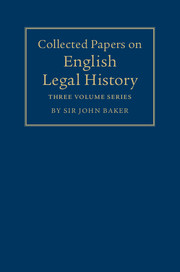Book contents
- Collected Papers on English Legal History: Volume I
- Contents
- List of Illustrations
- Acknowledments
- List of Abbreviations
- Introduction
- PART I The Legal Profession
- PART II The Inns of Court and Chancery
- PART III Legal Education
- PART IV Courts and Jurisdictions
- Collected Papers on English Legal History: Volume II
- Contents
- PART V Legal Literature
- PART VI Legal Antiquities
- PART VII Public Law and Individual Status
- PART VIII Criminal Justice
- Collected Papers on English Legal History: Volume III
- Contents
- PART IX Private Law
- PART X General
- Bibliography of the Published Works of Sir John Baker
- Index
Introduction
Published online by Cambridge University Press: 05 December 2014
- Collected Papers on English Legal History: Volume I
- Contents
- List of Illustrations
- Acknowledments
- List of Abbreviations
- Introduction
- PART I The Legal Profession
- PART II The Inns of Court and Chancery
- PART III Legal Education
- PART IV Courts and Jurisdictions
- Collected Papers on English Legal History: Volume II
- Contents
- PART V Legal Literature
- PART VI Legal Antiquities
- PART VII Public Law and Individual Status
- PART VIII Criminal Justice
- Collected Papers on English Legal History: Volume III
- Contents
- PART IX Private Law
- PART X General
- Bibliography of the Published Works of Sir John Baker
- Index
Summary
I never planned to become a legal historian. At school I was persuaded at an early age that my future lay in chemistry. Having duly applied to university to read natural sciences, I suddenly decided that I was set on the wrong course and announced that I wished instead to read archaeology. My excellent headmaster soon put paid to that – impossible, he said, without Greek. I therefore took what seemed to be the only remaining option and embarked upon the study of the law. The intention was to become a barrister, though my experience of the law courts was limited to a few days' attendance at Chelmsford assizes as trumpeter to the high sheriff of Essex. I joined the Inner Temple in 1963, ate my dinners, was duly called to the bar, and have retained a life-long interest in the inns of court and their contribution to English history. But the projected career did not materialise. There were only 2,200 barristers in practice then, and starting was not easy. Before I had occasion to experience the difficulties, Professor G. W. Keeton, head of the Department of Laws at University College London, suggested that I might take up an assistant lectureship on graduation – supposedly to support me while I sorted out a pupillage. This was duly arranged, without a formal application, let alone an appointments committee. A little later he suggested that I might submit a doctoral thesis in my spare time.
- Type
- Chapter
- Information
- Collected Papers on English Legal History , pp. 1 - 16Publisher: Cambridge University PressPrint publication year: 2013
- 1
- Cited by



